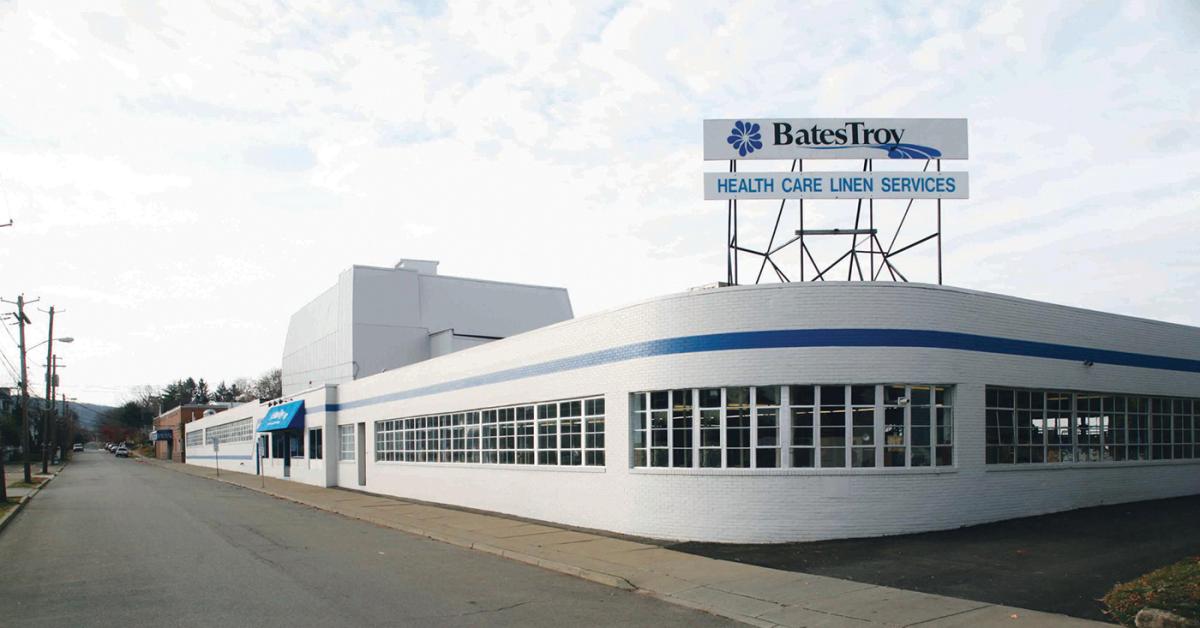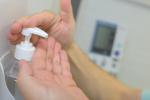BINGHAMTON, N.Y. — Bates Troy Healthcare Linen in Binghamton, New York, has a long history.
The company dates to the late 1800s when two laundries started: Bates Steam Laundry and Troy Laundry.
In the early 1900s, the two operations joined to form Bates Troy.
Enter the Kradjian family.
The Kradjians have owned and operated the laundry since the 1940s, but the family’s history with the operation began, dramatically, in 1915.
“My grandfather Kenneth and his brother Arthur Kradjian emigrated to America, as young teenagers, escaping the Armenian Genocide of 1915 perpetrated by the Ottoman Empire,” says Brian Kradjian, president of Bates Troy.
“They settled in Binghamton, New York, via Ellis Island for the promise of work in the Endicott Johnson Shoe factory where they worked extremely hard and long hours like many immigrants of their time.”
The brothers, along with another relative, were eventually able to pool their money to purchase a small dry cleaner, Ballard & Ballard Dry Cleaning.
They experienced some success and purchased other competitors, eventually buying Bates Troy in the early 1940s.
“At our peak, we had over 15 retail dry-cleaning stores,” shares Brian. “Bates Troy was a mixed plant doing dry cleaning and laundry.
“On the laundry side, we did house-to-house routes and diapers, later adding uniforms, food and beverage, hospitality, mats, and a small amount of healthcare.”
From World War II to the late 1980s, the area was very stable and prospered. The Binghamton area was the birthplace of IBM, which flourished and was flush with engineering jobs and ingenuity.
“I joined the business in 1993 after college,” Brian says. “In the mid-1990s, my father, Ara Kradjian, had the vision to specialize in healthcare, and it was exciting for us to envision retooling and repurposing our old, tired plant. We had a lot of inefficient conventional washers, high maintenance, breakdowns, overtime, etc., so we knew we had to be a low-cost producer.
“We invested in our first Lavatec 110 Continuous Batch Tunnel Washing (CBTW) System to pursue healthcare and be dependable which is demanded. We had a second $4.5 million expansion in 2008 where we had building additions and brought in our second larger CBTW System.”
Today, Bates Troy Healthcare Linen is a third-generation, locally-owned and -operated family business that’s thriving.
As a Hygienically Clean accredited laundry, it specializes in acute, non-acute and long-term care environments with a market radius of 120 miles from Binghamton.
HEALTHCARE FOCUS
Greater Binghamton was a stable manufacturing and defense-based area with a population of 250,000 until the late 1980s when the downsizing of IBM, GE, Link Simulation and others started, which resulted in job and population flight both locally and statewide.
“We saw our retail dry-cleaning business go from 15-plus stores down to five stores, along with our margins,” Brian shares. “As a mixed plant, our productivity and efficiencies were low. The dry-cleaning industry was changing along with our area.
“Healthcare was an area that was specialized, growing, would never be offshored/outsourced, and prior to COVID was often thought to be recession-proof, although be it an entirely different, high-volume low-margin model.”
He says that healthcare linen—acute (hospitals), non-acute (outpatient clinics) and long-term care (nursing homes)—represents 97% of the company’s business.
The retail dry cleaning and laundry segment has two drop-off store locations with on-site alterations. They also offer wash and fold service, fire and water restoration, and hotel dry cleaning.
While the dry-cleaning business is less than it used to be, the operation has won the Reader’s Choice Awards for Best Dry Cleaner in the area for 15 years.
The healthcare linen operation runs two shifts on sort and wash along with 1.5 shifts of finishing Monday through Friday and a third of a day on Saturdays.
“We have about 160 employees overall with a truly diverse, multicultural workforce,” Brian says.
Bates Troy processes around 20 million pounds of soiled linen per year with more than 17.25 million pounds clean delivered per year. The processing happens in a well-equipped, 50,000-square-foot plant.
Bates Troy Healthcare Linen Services was certified by the Healthcare Laundry Accreditation Council (HLAC) from 2007-2022, one the first of 25 laundries to do so, Brian says.
The operation has been TRSA Hygienically Clean accredited for the past two years.
“We measure productivity in all departments and strive for continual improvement,” Brian shares. “As they say, ‘You can’t manage what you don’t measure.’ We continually invest in our people, plant and equipment.”
Bates Troy leases its delivery fleet, and Brian says the company has a 6-year age limit on the trucks it uses to ensure dependability.
“Bates Troy is always trying to upgrade SKUs where we can and offer high-quality linen within the Upstate New York market,” Brian says.
SERVICE-MINDED AND NIMBLE
Brian shares that Bates Troy is a smaller laundry relative to others, and it has a small, nimble management team of 12 that can implement changes/solutions quickly for its customers.
“Our team is strong, very competent and has a lot of combined linen experience,” he says.
“In any service business composed of people and machines which are both subject to failure, there can always be a hiccup, but it is the responsiveness to problems or issues which is always important. We do not have a large corporate bureaucratic structure.
“We treat our employees well and have a healthy dynamic between management and production.”
Brian adds that a Bates Troy customer can always reach just about anyone in the company, from sales and service to management and ownership.
“Bates Troy has cultivated many long-term partnerships with our customers beyond just vendor/client dynamics,” he says. “We offer high-quality linen, great service, at a good value.
“We visit our customers frequently. We try to demonstrate true value-added service as opposed to treating linen merely as a commodity, which is always the challenge for our industry.”
BIG HEART
Besides close partnering with its customers, Bates Troy partners with many community organizations.
“Bates Troy invests in our local community supporting many nonprofits, charitable organizations, community events, etc.,” Brian says.
The company is a corporate partner of New York Industries for the Disabled (NYSID), participating in the Preferred Source Program and creating meaningful employment for individuals with disabilities.
Bates Troy also partners locally with Achieve for job training and the Association for Vison Rehab and Employment (AVRE) where their disabled individuals process (folds) some of its work offsite.
The company has participated in the WBNG Annual Coats for Kids Drive for more than 20 years. Every year, Bates Troy launders and dry cleans 1,300-1,500 coats free for children whose families cannot afford and need winter coats.
“This year it amounted to over $25,000 in donated dry cleaning and laundry services,” Brian says.
In 2007 and 2011, Greater Binghamton was devastated by 500-year floods. Bates Troy supplied linens at no cost for displaced residents taking emergency shelter at Binghamton University Event Center, and Brian says, “It was our duty.”
Finally, a team of 50 people from Bates Troy participated in the American Heart Association of the Southern Tier Annual Heart Walk at the end of April.
“We are a small company with a big heart,” says Brian.
FOCUS ON SUCCESS
Like many healthcare laundry operations, COVID-19 was a challenge for Bates Troy with volume loss initially on the hospital customer side and then, later, on the nursing home side.
“Many nursing homes in New York State still have not fully recovered in census and staffing,” points out Brian.
“The pandemic forced a lot of businesses to adapt, get better or perish. We also pivoted to PPE (personal protective equipment) processing and invested in Kannegiesser equipment to process it.”
Then came hyperinflation, which impacted all laundries, customers, businesses and consumers alike.
Although these pressures have largely decreased (rate of inflation) many cost inputs for laundries (labor, electricity, natural gas, plastics, chemistry, insurance) are still higher than where they were a few years back, he says.
“Last, but not least, New York State has had an aggressive minimum wage phase-in from 2013-2024 where wages increased from $7.25 an hour to $15 an hour,” shares Brian.
“With more increases in the next two years, which all laundries face, this will result in increased costs of services and the push for automation.”
One “push” that Brian says Bates Troy is proud of is its green and sustainability efforts.
“We have saved millions of gallons per year since 2008 when we installed our more efficient CBTW,” he says. “We have saved significant electricity and carbon footprint since 2011 when we installed our own $1.5 million microgrid.
“We have successfully worked with the New York State Energy Research and Development Authority (NYSERDA).”
Brian shares that Bates Troy also takes a lot of satisfaction when it converts an inefficient on-premises laundry (OPL) to outsource its linen, resulting in cost savings to the customer, higher quality linen, fewer skin incidents (removing detergency and better pH), improved service, costly equipment replacement cost avoidance, repurposing the OPL space and the intangible aspect of it no longer worrying about processing their linen (rising wages, benefits, labor scarcity, etc.).
“We perform an analysis of their OPL covering all cost centers, which most OPLs rarely fully quantify,” he says.
“It is also gratifying to help lower a customer’s linen loss by examining their loss points and seeing a motivated customer work with us to reduce their loss.
“Not all healthcare organizations have the bandwidth to make such reductions or the ability to impact nursing.”
From time to time, Brian says, Bates Troy helps non-customers when they have breakdowns or emergencies.
“As my father, Ara, always said, ‘Even though our address is Laurel Ave., we can never rest on our Laurels’ continues to ring true,” he shares. “We are blessed to have good people and a supporting wife and family.
“We are focused on continual improvement, safety and measured growth.”
Have a question or comment? E-mail our editor Matt Poe at [email protected].







